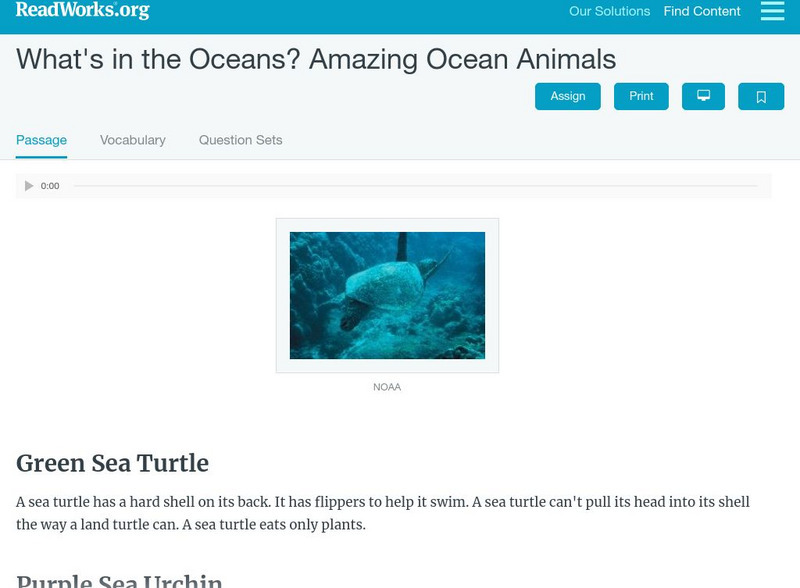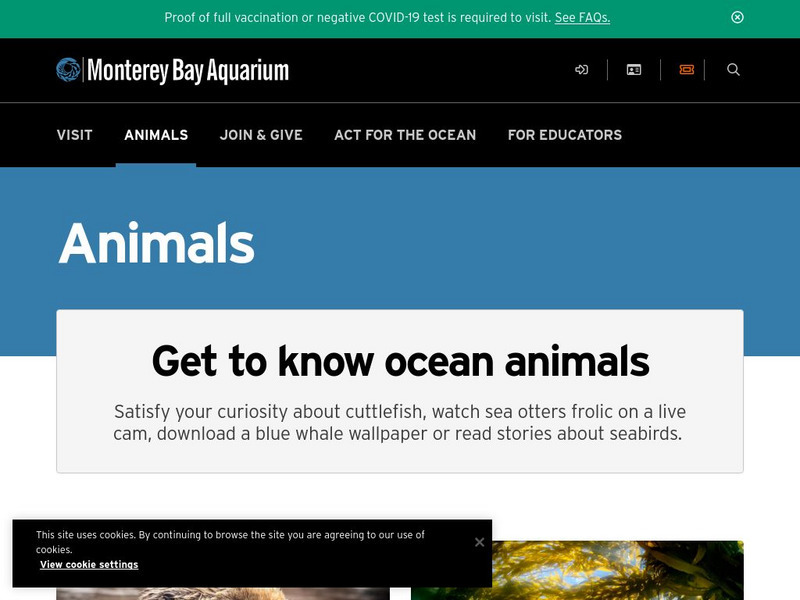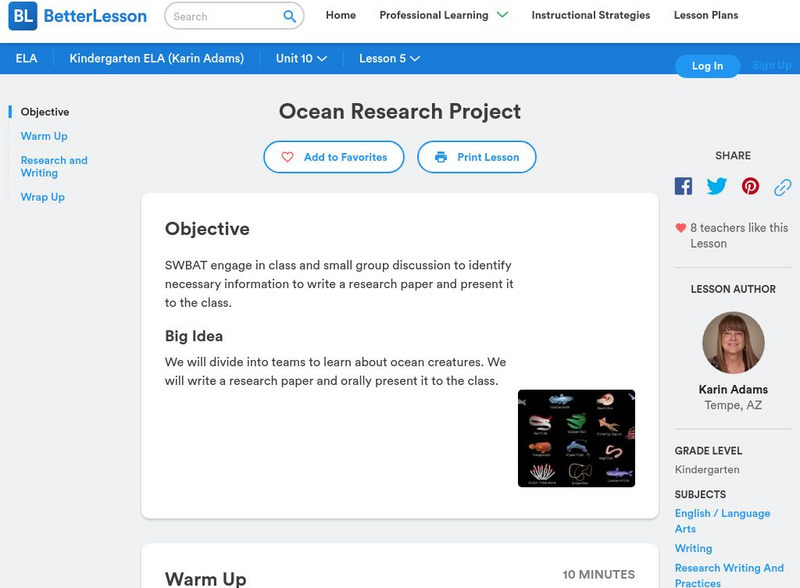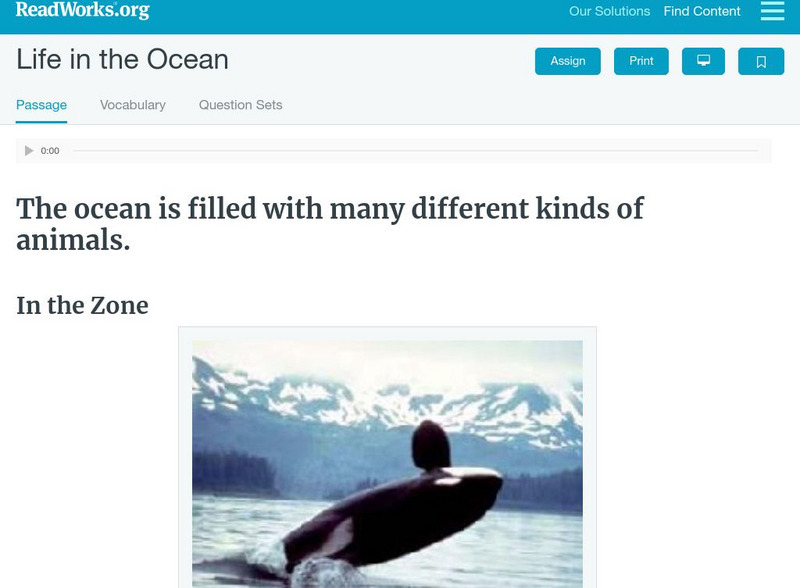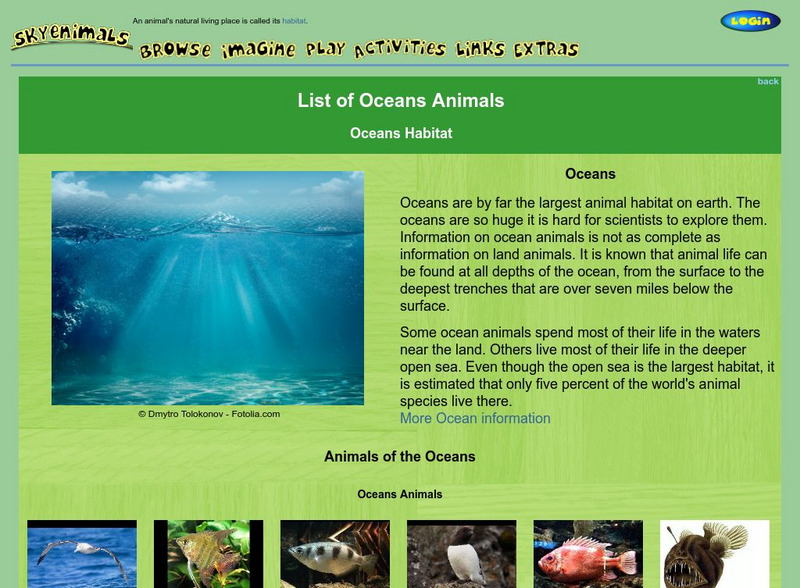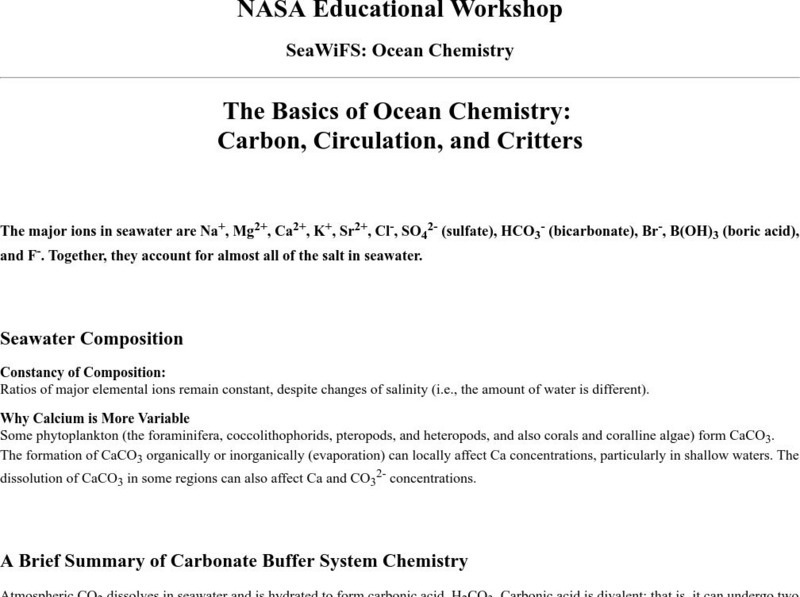Unite for Literacy
Unite for Literacy: Animals: Who Is in the Ocean?
A riddle book about ocean animals. Includes audio narration in 17 additional languages with text in English.
Climate Literacy
Clean: Understanding Ocean Acidification
The following is a series of 5 activities regarding ocean acidifcation Students will learn about rising Carbon Dioxide in the atmosphere, climate change, ocean reefs, marine calcifers and ocean pH.
Read Works
Read Works: What's in the Oceans? Amazing Ocean Animals
[Free Registration/Login Required] An informational text about some of the animals found in the ocean including: sea turtles, sea urchins, starfish, sea horses, and clownfish. A question sheet is available to help students build skills...
Monterey Bay Aquarium
Monterey Bay Aquarium: Animal Guide
An extensive image-rich field guide to marine habitats and inhabitants, with detailed descriptions and "cool facts" about each.
PBS
Pbs: Secrets of the Ocean Realm
At this site students can read about sea creatures and ocean plant life, and see pictures of each.
Boise State University
Boise State University: Ocean Exploration: Abyssopelagic (Abyssal) Zone
Learn about the very cold, dark region of the ocean known as the abyss. Includes information on the origin of the name of this ocean zone, as well as information on its depth and animal life.
American Museum of Natural History
American Museum of Natural History: It Takes All Kinds to Make a World
Learn about the biodiversity found in the ocean by looking at examples of marine life.
The Franklin Institute
Treasures@sea: Exploring the Ocean Through Literature
This extensive resource consists of learning activities that integrate language arts with oceanography. Each activity is based on one of seven books about the ocean and are written to be adaptable. Includes writing activities, games and...
NOAA
Noaa: Pacific Marine Environmental Laboratory: North Pacific Ocean
This site shows a map of the North Pacific Ocean and the surrounding seas. You can study the islands, or the ocean currents in detail.
Alabama Learning Exchange
Alex: Diverse Life Forms of the Ocean
This lesson allows students to view and draw conclusions on the importance of life in the ocean. It uses student created movies to explore what is going on, as well as identifying the zones and diverse life associated with the oceans....
TED Talks
Ted: Ted Ed: The Weird, Wonderful World of Bioluminescence
In the deep, dark ocean, many sea creatures make their own light for hunting, mating and self-defense. Bioluminescence expert Edith Widder brings some of her glowing friends onstage, and shows more astonishing footage of glowing undersea...
BBC
Bbc: New Marine Life Found in Deep Sea Vents
Six new animal species are identified at deep-sea vents beneath the Indian Ocean. Find out what new creatures are stirring in the sea.
Other
Ocean Oasis: Field Guide
Ocean Oasis is a giant-screen film that depicts Mexico's Sea of Cortes and the Baja California desert. This companion site features much of the information the film has, such as beautiful images of animals, water, and land that have...
NOAA
Noaa: Pacific Marine Environmental Laboratory: What Is El Nino?
This page tells you what El Nino is, provides links to animations and videos on El Nino, explains how to recognize El Nino, and discusses the history of significant El Nino events.
Read Works
Read Works: Ocean Animal Discovery
[Free Registration/Login Required] An informational text about the discovery of ocean animals. A question sheet is available to help students build skills in reading comprehension.
Better Lesson
Better Lesson: Ocean Research Project
Research paper writing is a lofty goal for kindergarten students, but this lesson will expose them to the process without being overwhelming. Students will divide into teams to learn about ocean creatures and then write a research paper...
Read Works
Read Works: Life in the Ocean
[Free Registration/Login Required] An informational text about the different depth levels of the ocean and the types of animals that live in each. A question sheet is available to help students build skills in reading comprehension.
Ducksters
Ducksters: Science for Kids: Marine or Ocean Biome
Kids learn about the marine biome. The largest biome by far, the oceans cover most of the Earth's surface.
Other
Skyenimals: List of Ocean Animals: Ocean Habitat
Learn about the largest animal habitat on Earth with this website that gives facts and images of the ocean habitat. Site contains pictures and images of ocean animals.
NOAA
Noaa: Ocean Explorer: Krill in National Marine Sanctuary
An overview from Ocean Explorer of the the marine crustacean, Krill. Includes info about life cycle, habitat, behavior, environmental importance and images.
ClassFlow
Class Flow: Ocean Life
[Free Registration/Login Required] This flipchart is about the different ocean zones: sunlight zone, twilight zone, and midnight zone. It contains video about ocean life in the different zones.
Science Education Resource Center at Carleton College
Serc: Bridge: Ocean Sciences Education Teacher Resource Center
Bridge, the Ocean Sciences Education Teacher Resource Center, is a growing collection of on-line marine education resources. It provides educators with accurate, useful, content-correct and content-current marine and data information on...
Woods Hole Oceanographic Institution
Woods Hole Oceanography Institute: Adaptations to Light
View several pictures of ocean life through the eyes of scientists and staff at Woods Hole Oceanography Institute. This particular slideshow highlights how ocean creatures change their colors in order to either hide from or frighten...
NASA
Nasa: The Basics of Ocean Chemistry: Carbon, Circulation, and Critters
An explanation of ocean chemistry, supported by illustrations, for example, of the global carbon cycle in the 1980s and the annual carbon dioxide flux. The concentration of nutrients in the ocean is discussed for its impact on marine...




